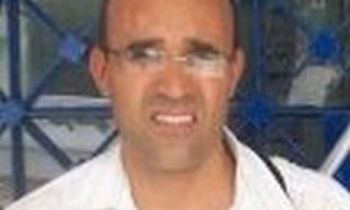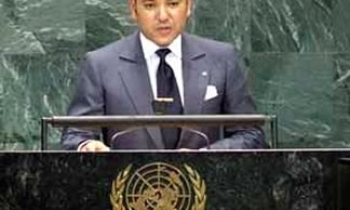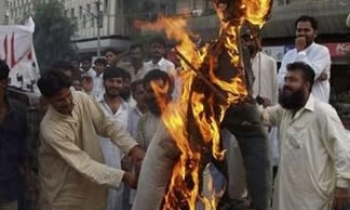About two years ago, when he was ten, the boy Basel asked his father, Abd a-Razek Faraj, to start praying. It was after the fourth or fifth or sixth time - who remembers, anymore - that a military commander in the Judea and Samaria region issued an administrative arrest warrant against Faraj - in other words, extended again the original arrest warrant issued on April 24, 2002.
"Allah is punishing you for not praying," Basel told his father, who is imprisoned at Ketziot, a prison camp in the Negev. The worried father, who is avowedly secular, asked his younger brother to explain to Basel that there is no connection between his prolonged arrest without trial and his relationship with Allah. "There are lots of Hamas members who pray every day and are nevertheless held in administrative detention like your father, meaning detention that you do not know when it ends," explained the uncle to the child.
At first, the military commander, acting on the Shin Bet's recommendation, issues a decision to send the detainee into administrative detention for six months, because they suspect that he constitutes a "threat to the security of the region and to the public," wrote Faraj in an op-ed piece that ran in Al Quds on December 21. "The detainee thinks to himself, `This isn't a disaster; it's a short, fixed amount of time, it'll pass quickly and I'll go back to my family, a free man.'
After all, there is a release date that has been determined in advance. He knows it's a virtual date, but deep inside him there is this ongoing conversation. "Maybe they've reached the conclusion that I no longer represent any threat to their security or to that of their citizens?"
The column was published 10 days before the military judge Major Michael Ben-David approved the 12th administrative warrant issued against Faraj, 42, an economist who worked for years as the night editor of Al Quds, and by day was a project manager in an NGO agricultural development. The last extension warrant was issued on November 20, 2005. All told, Faraj has spent 44 months in prison without trial. The standard formulation: "For regional security and public security reasons, the military commander orders the extension of Faraj's arrest... due to his being an activist in the Popular Front who endangers the security of the region and the security of the public."
Based on data furnished by the Israel Defense Forces to the human rights organization Hamoked, the Center for the Defense of the Individual, as of December 28 there were 749 Palestinian administrative detainees imprisoned in the army's prison facilities in Israel: 89 at Ofer (northwest of Jerusalem), 658 at Ketziot and two in detention cells in army bases in the West Bank. In an October 7 column, Faraj wrote that 135 of the administrative detainees have already been imprisoned for two years, and 22 for more than three years.
Approval of a new or renewed administrative detention warrant takes place as part of what is called "judicial oversight," subsequent to which the detainee has a right of appeal. The prosecutor, Corporal Zaher Salah, told a "judicial oversight" session on November 30 that "confidential intelligence data [against Faraj - A.H.] has been received, and that information strengthens the existing material... It would be right to approve the administrative detention warrant because the detainee is liable to be dangerous."
Attorney Tamar Peleg of Hamoked is representing Faraj. At an administrative detention hearing, in the absence of details of the charges, any witnesses or evidence, the defense attorney interrogates the prosecutor. The prosecutor is appearing in the trial as the representative of the military commander who signed the warrant, but actually functions as a representative of the Shin Bet. It is not his job to be interrogated, Peleg explains, and by her questions to him she attempted to get a clue of any sort of what might be contained in the confidential material. This is an excerpt of the written protocol of the hearing:
Peleg: The lion's share of the material relates to the Popular Front and not to my client, not to his actions, not to his statements. Right?
Prosecutor: No, that isn't so.
Peleg: There isn't any material at all on the popular Front?
Prosecutor: Yes, there is detailed material that pertains to the respondent, and aside from that there is also an evaluation of the situation in the field, and how it pertains to the Popular Front organization.
Peleg: Is it about different opinions or different groups within the organization, about differences of opinion on matters of principle, such as elections or terror attacks?
Prosecutor: It's in there - everything will be defined confidentially.
Peleg: Does the fact that he is a journalist appear in the file?
Prosecutor: No.
Peleg: Do reports about ...political columns that he published in the newspaper Al Quds appear in the file, and if so, are you aware of their contents?
Prosecutor: No.
Peleg: Are you aware of the opinions of my client, or of my client's election-related activity?
Prosecutor: There are reports, and they will be defined confidentially...
Peleg: I am telling you what his attitude toward the elections is: He supports the elections and even wishes to take part in them. In the course of his interrogation, all sorts of suspicions were raised against him, and in any case since he became an administrative detainee, there is no charge that has anything to do with violent activity...
Prosecutor: We're going back to the confidential material, but that will be defined confidentially.
Peleg: I am saying that my client does not support the organization. Can't you confirm that?
Prosecutor: It will be defined confidentially.
Peleg: In this case, you simply do not know, because you have not adequately reviewed the confidential material. Write down that the correct answer is that he is opposed to the use of force in the framework of the Israeli-Palestinian dispute, and is particularly opposed to harming civilians.
In her summation, Peleg contended that Faraj is sitting in prison "because of the past terror attacks of the Front, with which he has no connection" and not because of his actions.
She expressed regret that the Shin Bet does not know that her client is a journalist, and wondered how it was possible to evaluate the degree of danger presented by an individual without knowing what he'd written during his administrative detention.
Participation in the election process - and in the broad framework of leftist-democratic organizations, which her client supported - was evidence, Peleg said, of a desire to be part of a civil-social process. This was aside from the fact that "the organization's behavior while an individual is under arrest cannot be grounds for arrest, and certainly not the primary grounds." Faraj himself told the judge that he supports peace on the basis of UN resolutions pertaining to the Israeli-Palestinian conflict.
But Ben-David was not convinced.
In his decision of December 22, he wrote: "I held a confidential hearing in the presence of a representative of the Shin Bet, who is called `Dan.' On that occasion, I gave the Shin Bet representative the articles by the respondent, and asked to receive their opinion... In the confidential hearing, `Dan' described to me the full extent of the material pertaining to the respondent and the substantial concerns about the region's security should he be released at this time. Due to concerns of harming the security of sources of information, or to the methods of activity of the Shin Bet, it is not possible to disclose any details of the confidential information that was presented to me, beyond what has already been disclosed in previous court sessions."
Although Ben-David trimmed the duration of the arrest warrant from six months to four months, his conclusion is unequivocal:
"The confidential information that is at the basis of the detainee's administrative detention is serious, and also includes highly updated material that is based on a variety of credible sources. A suspicion arises from the full extent of the information that was presented to me that in the event of his release, the detainee would continue to act counter to the region's security... I have been persuaded that down-to-earth considerations of upholding the region's security and public security and the desire to avert any future danger posed to them by the detainee are the grounds for the decision to extend the administrative detention. An examination of the nature of the detainee's activities demonstrates that there is a basis for the assessment that the danger posed by the detainee will not diminish in the months to come."
In previous decisions handed down in the ongoing Faraj case, other judges - such as Lieutenant Colonel Shlomi Kochav and Major Menachem Lieberman - adopted a very, very similar turn of phrase, about "matter-of-fact considerations" of "maintaining the security of the region and of the public" or "confidential material that may not be disclosed so as not to reveal Shin Bet methods."
Regarding the role of the military judge in the administrative detention process, Faraj wrote: "The experience of the administrative detainees proves beyond any shadow of doubt that the judicial system, vis-a-vis the administrative detainees, is solely acting `ostensibly,' and that the role of this system is to beautify a procedure in which the Shin Bet is the only factor with any influence."
The article that was published in Al Quds is one of the articles that Peleg submitted to the judge and the Shin Bet representatives for their review. "... At times, the Shin Bet people determined the duration of their arrest in front of the detainees, even as their interrogation progressed. There were cases in which Shin Bet people explicitly told detainees that they would stay under arrest for at least five years. In other words, it is the Shin Bet people who determine the sentence of the detainees, without putting them on trial. And in such instances, it is the job of the judge to give a judicial inshallah [it's God's will] for the Shin Bet people's decree and sentence."
Faraj, who was born in the Jalazoun refugee camp, and whose family traces its roots to Lod, is a frequent contributor of political columns to Al Quds.
On December 12, ten days before the judge approved the extension of his arrest warrant for the 12th time, Faraj wrote: "When only a few days divide the detainee from the date of the completion of his arrest period and his gaining of freedom, his eyes are always fixed on the iron gate, he waits and waits, clarifying the nature of every paper that comes in to the department. `Maybe it's a new arrest warrant?' The family begins to worry, calling each day to ask, `Have they renewed your arrest warrant?' `Not yet,' he answers, `but don't expect much, the possibility of it being renewed exists up to the last minute.'"









